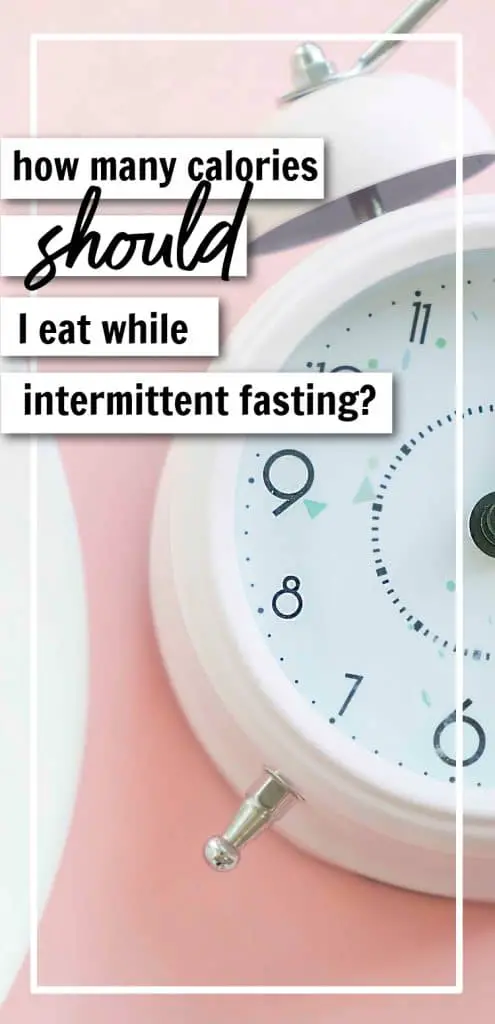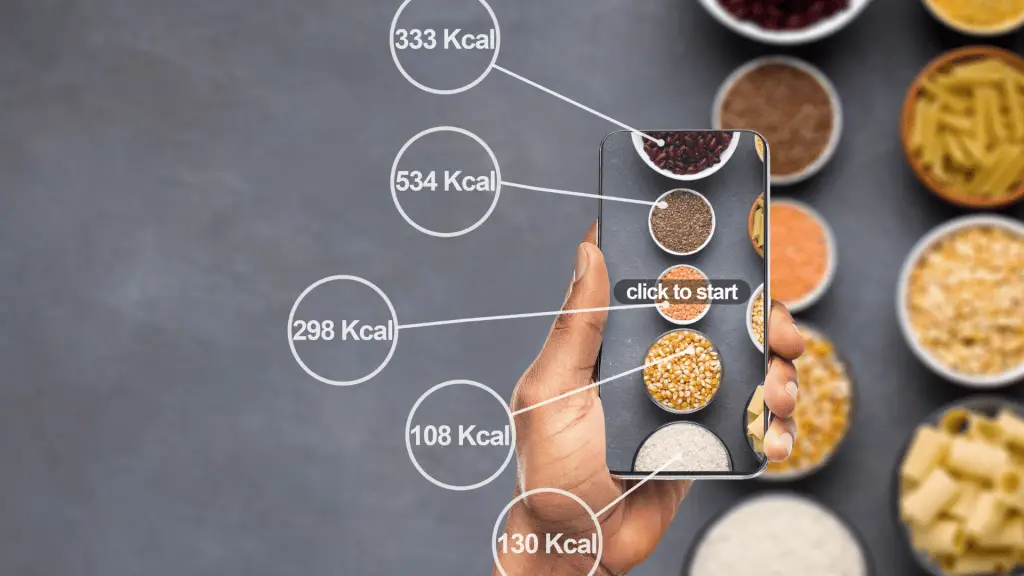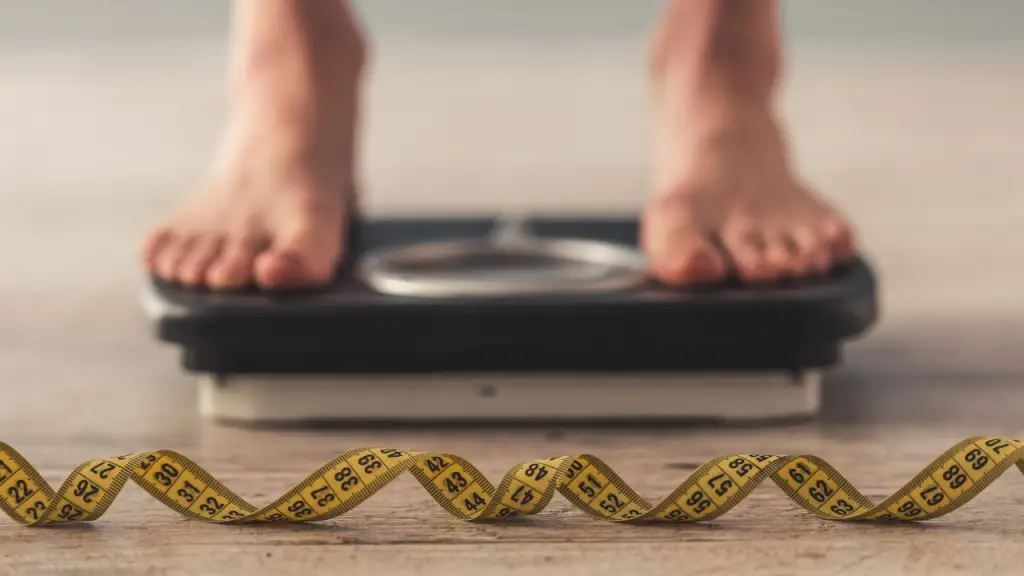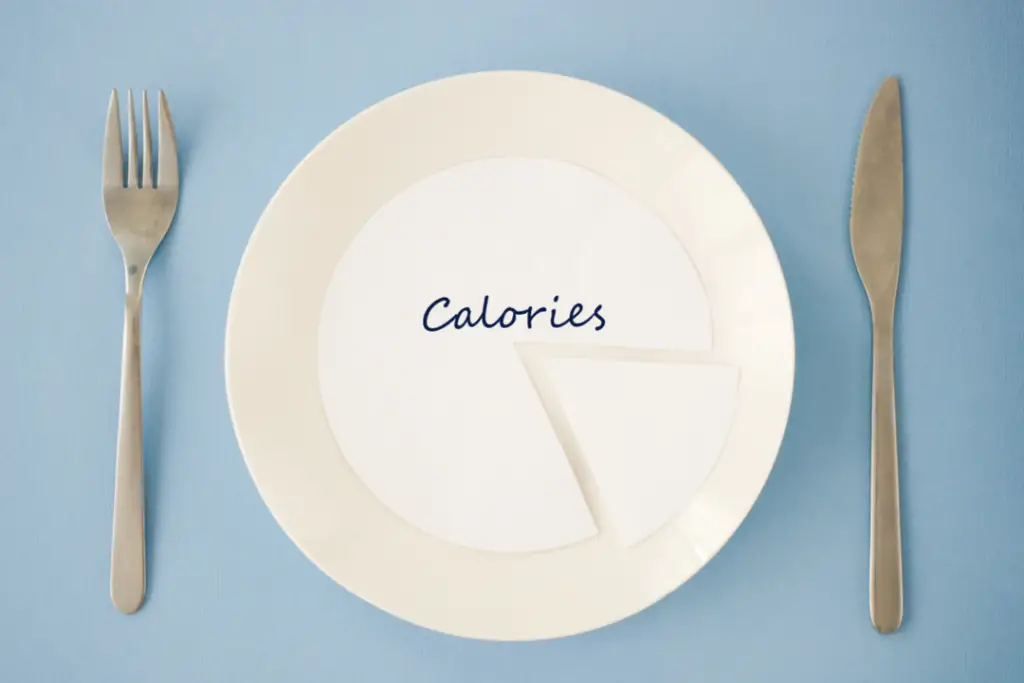As you may already know, I don’t recommend you worry about counting calories while intermittent fasting. However, it can be used as a troubleshooting strategy when you can’t seem to lose weight. Furthermore, tracking calories can be helpful to ensure you are eating ENOUGH. This post will address how intermittent fasting works aside from naturally decreasing your calorie intake. Then, I will show you how to determine how many calories you should eat while intermittent fasting for weight loss.
How Intermittent Fasting Works
Intermittent fasting doesn’t promote weight loss only because it creates a calorie deficit. Intermittent fasting also induces a metabolic change. What is the metabolic change I am referring to? It’s your body switching over to fat burning from glucose burning. If you fast long enough, your body will run out of glycogen and start producing ketones from your fat cells for energy. This is how you can be in ketosis without being on the keto diet.
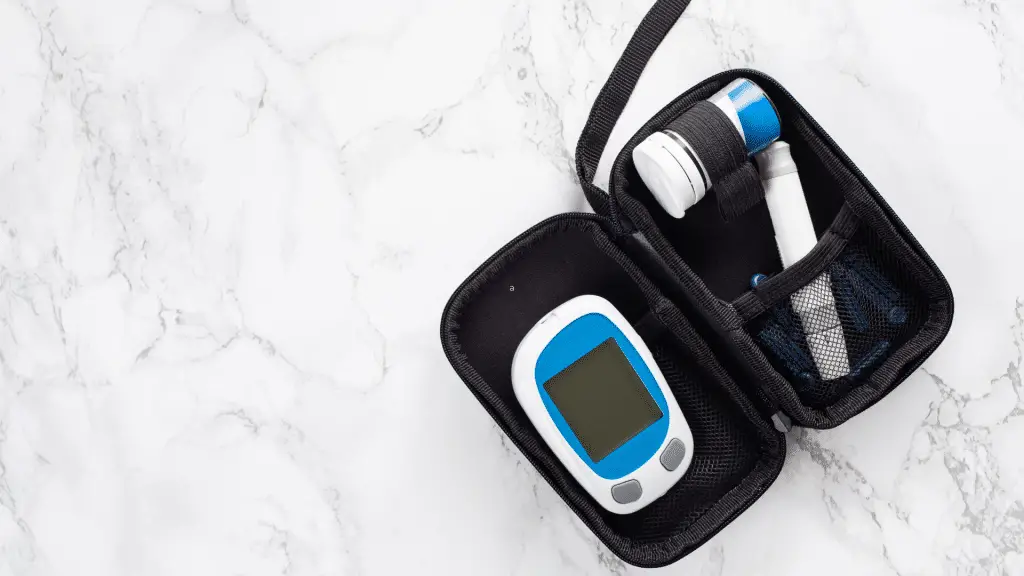
How to Fast Long Enough to Achieve Ketosis
If you want to benefit from intermittent fasting in a way that goes beyond calorie restriction, you need to ensure you are fasting long enough to induce this metabolic switchover. There are two ways to do that:
- Pay close attention to how you feel.
- Use a ketone monitor.
If you are going to only use the way you feel as a baseline, I would say it is essential that you start by doing a 5-day modified fast or a 7-day keto cycle before determining your intermittent fasting window for weight loss. You must ensure you stay in optimal weight loss ketosis for at least two hours on your fasting days.
How It Feels to Be In Optimal Weight Loss Ketosis
The first time I knew I was in optimal weight loss ketosis was on Day 2 of my second 5-day modified fast. Here’s what I noticed:
- My hunger no longer made me hangry. Instead, it was just a sensation in my belly.
- I felt more energetic.
- I felt more focused.
- My appetite had decreased.
At that moment, I wondered if I could be in ketosis. I decided to buy a ketone monitor to check my ketones for further experimentation.

Measuring Your Ketones to Know You Are in Optimal Weight Loss Ketosis
Using a ketone monitor is helpful to confirm that you have switched to fat-burning. You are officially in ketosis and will reap many fasting benefits as soon as your ketone level hits 0.5 mmol/L on a ketone monitor. However, that is not optimal for weight loss ketosis. Optimal weight loss ketosis is probably between 1.0 and 2.0 (depending on how you feel). To reap weight-loss benefits, you should stay at your optimal ketosis level for about 2 hours on your fasting days. This is the level where you notice you feel hungry but happy.
If you want a ketone monitor, I recommend the Keto Mojo. Receive a 15 percent discount with my affiliate link.

Read Using Intermittent Fasting for Metabolic Flexibility to dig deeper into this topic.
How Many Calories Should I Eat While Intermittent Fasting for Weight Loss
Ok, now I hope you understand that losing weight with intermittent fasting isn’t just about calories. Generally, intermittent fasting doesn’t require counting calories. However, counting calories can be used as a troubleshooting tool. It may be useful to track your eating patterns, particularly on your nonfasting days.
Tracking Your Calories When Intermittent Fasting
If you follow my advice on intermittent fasting for metabolic flexibility, you will most likely be fasting longer hours less frequently. You are likely to consume fewer calories on your fasting days. Consequently, we will focus on your weekly calorie intake rather than daily. You need a weekly deficit of 3,500-7,000 calories to lose about one pound a week. I don’t know if you realize how much that is! That’s why I have written so much content about realistic weight loss expectations! For example, read You Can’t Seem to Lose Weight: Is Your Metabolism Broken?.
I typically recommend women aim to lose around 2 lbs a month (mainly when their overall weight loss goal is 20 lbs or less). It will make weight loss more manageable, less stressful on your body, and more sustainable in the long term. You learn to shift your eating habits gradually. Consequently, you can aim for a calorie deficit in the 1,700-3,500 calories range.
Another common recommendation is to create a calorie deficit of 10 percent of the number of calories you need to maintain your weight. This will mean a deficit of about 1,400-1,700 calories a week for many women.

Determining How Many Calories You Should Eat to Maintain Your Weight
To determine how many calories you should eat while intermittent fasting for weight loss, you need to figure out how many calories you need to eat to maintain your weight. From there, you can subtract your weekly 1,700 calories or calculate what 10 percent fewer calories would amount to for you.
I love this article as well as the calorie calculator that it provides. Use the calculator to determine how many calories you need to eat to maintain weight. Then, calculate how many calories you need to lose weight.
Counting Calories With Three Favorite Intermittent Fasting Methods
Counting calories when intermittent fasting isn’t just about troubleshooting a lack of weight loss results. You can use it to check that you are eating enough. Here are some examples of how you can count calories while intermittent fasting:
- 5:2 Method: With the 5:2 Method, you are eating only 500 calories two days a week. That is an automatic calorie deficit of 3,000 calories a week! Simple!
- Eat-Stop-Eat Method: Similarly, the Eat-Stop Method method creates a natural calorie deficit of about 2,600 calories (two days with only one meal).
- Warrior Diet: The Warrior Diet will work differently since your eating window will be 4-hour long 5 days a week. There is a pretty good chance it will naturally decrease your calorie intake naturally, but you could track your fasting days to see how much you are eating.
Make sure your calorie intake for the week doesn’t dip below 9,800. Eating enough is important to avoid stressing your body too much.
How Many Calories Should I Eat While Intermittent Fasting for Weight Loss Video
In Summary
In conclusion, remember: that intermittent fasting works because it heals your metabolism. It improves your insulin sensitivity and teaches your body to use fat cells for energy. Of course, the number of calories you consume matters, but it’s not everything! I would use calorie tracking to troubleshoot weight loss but take your time before you take this step as most intermittent fasting methods will naturally decrease the number of calories you consume to the exact number you need.
